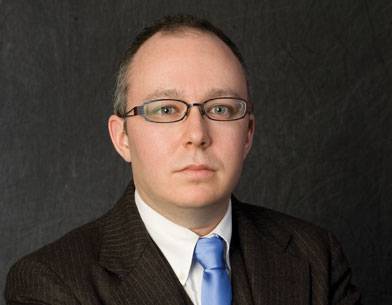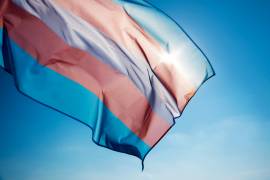
My Coming Out Letter
Blog Search
Cole Thaler, former Transgender Rights Attorney at Lambda Legal, shared this letter with us today, National Coming Out Day:
“When I was twenty I was in love with words, a wordsmith.... Now I like the words to disappear, like a transparent curtain.” —Wallace Stegner
Today is National Coming Out Day! I’m a gay man. I’m also Jewish, left-handed, a lawyer, a vegetarian, and more politically radical than I usually let on. And I’m a female-to-male transsexual. Lots of you knew that last bit about me already, or surmised it, but others didn’t. It’s difficult to keep track of what I’ve explained to whom over the years; I should have started a spreadsheet in 1999.
For four and a half years my job was to advocate for transgender rights all over the country. I couldn’t have been more out. I talked about being trans in front of large audiences, drew upon it to build trust with my clients, offered myself as an example over and over. Since leaving that job, it’s been a relief and a pleasure to rediscover all of the other facets of my identity that I had forgotten about.
My transsexualism faded into the background, into something that I needed to disclose only to new lovers and doctors, and into the cavernous space it had occupied moved a hundred other passions: gardening, singing, cooking, learning new areas of law, learning how to be a good and devoted partner.
Being less out, and sometimes not out at all, changed my transsexualism. It disappeared like Wallace Stegner’s transparent curtain, becoming as invisible as my chromosomes. At times I would forget about it completely. In the best moments, the seam between me and other gay men would flatten, and their conversations and community would open warmly and absorb me. These moments were like dreams, like swimming without ever having to come up for air.
I haven’t really wanted to come all the way out again, to pick up the banner, to jeopardize those transcendent moments of acceptance.
What changed my mind, of all things, was Anderson Cooper. “I’ve been reminded recently that while as a society we are moving toward greater inclusion and equality for all people, the tide of history only advances when people make themselves fully visible,” Anderson wrote in his coming-out letter. “In a perfect world, I don't think it's anyone else's business, but I do think there is value in standing up and being counted.”
I’ve thought a lot about this, and I think he’s right. And so I’ve decided to take what had shrunk into a footnote and bring it up into the body of the text again.
I owe an apology to all of the family members to whom I could never figure out a way to come out that wouldn’t feel like the world’s biggest and most awkward non sequitur. I relied on the family grapevine to spread the news for me, and felt—is this cowardly?—tremendous relief when those family members continued to treat me the way they always had, never mentioning the masculinized elephant in the room. Yes, cowardly. I couldn’t find a way to have that conversation, and so I pressed on with my life without ever having it, and although it turned out well I probably should have handled things differently.
If you want my coming-out story, the details about my adolescent gender expression and my lengthy, fumbling effort to find my place in the queer community, take me out for a drink sometime and I’ll tell you all about it. For now, on that topic I will say only that Susan Stryker’s words rang deeply true when I came across them:
"I wanted to look like what I considered myself to be, and perceived that I was profoundly misplaced -- all of which evoked in me the utter sadness of feeling irremediably lost and alone in a situation impossible to rectify. I was not where others looked for me, and I was where they saw me not. Lacan says that 'the real' is the place that is always returned to; these feelings were real. I am agnostic as to their origin. I did not choose them. I chose only how I would inhabit the architecture of their affect."
Finally, there’s this: if you did not know about my transsexualism before reading this, ask yourself what, exactly, you think you know about me now. I ask you to resist drawing conclusions or making assumptions. In particular, I ask that you not revise your view of my authenticity as a gay man, and that instead you accept that—while my path to gay manhood may not have been as linear as yours—I have come to this place no less honestly. By writing this I am risking that the transparent curtain will turn into a pane of glass against which I can only press my face, looking from the outside in at the community to which I know in my core I belong. But that risk feels less important than writing this note, and posting it, in faith that its resonance will somehow make the world a little kinder.




